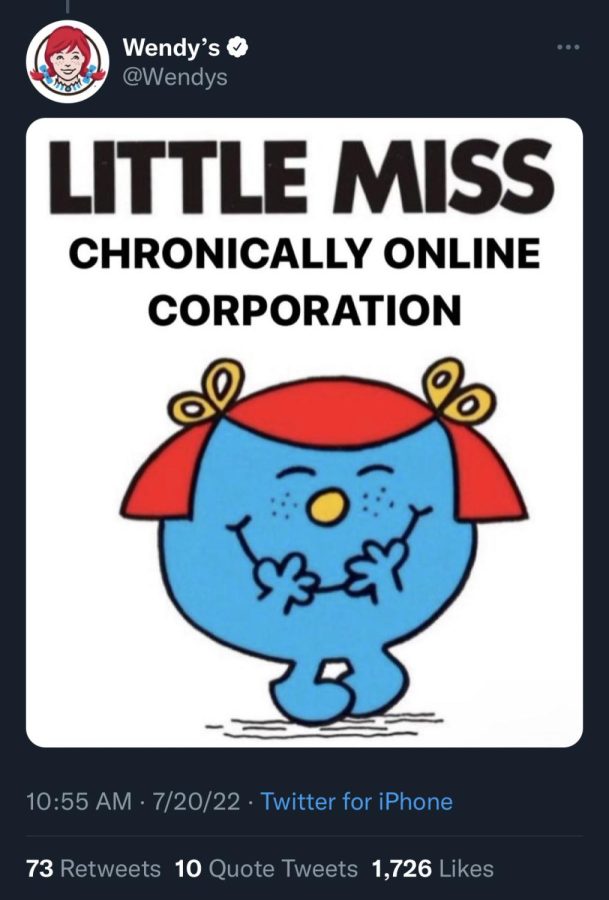“Prom?”
“Okay, but don’t get handsy and we have to be home by ten.”
This seemingly hilarious conversation between the 4 for 4’s pigtailed redhead Wendy and the King of burgers blew up on Twitter. How could these mascots go to the dance together if they are rivals? It’s like the nerds and the jocks going together in an 80s teen movie; it just doesn’t happen.
Well, Wendy isn’t real, the Burger King isn’t real and this conversation is probably just some young interns working in a cubicle too small for a paycheck a couple digits even smaller.
This epidemic of companies masking their cunning, multi-billion dollar operations with a personable character has stolen the hearts—and pockets—of social media users.
In the past decade, Wendy’s ignited a phenomenon that set them apart from any other corporation. Wendy’s transformed their social media presence from a rigid, daunting business into a charming individual—an unfiltered one who isn’t afraid to act unprofessional.
Mostly seen on Twitter, these corporations can be seen showing affection for things, roasting others and even saying expletives. What originally would be seen as very unprofessional has become the standard. Why is that?
These companies are masking the truth.
They don’t want you to think about the underpaid workers, the who-knows-what ways their food is sourced or what exec thousands of miles away is going home with an 8 figure salary.
Because look! If the account acts like a human, it can only mean they are humane right? No; these companies do not have personalities and they do not have feelings. There is truly only one thing they care about: profit.
I, too, am at fault for laughing at these accounts when they are on my feed. I have to remind myself from time to time that these tweets are coming from a company, not some friend.
Senior Jacob Cox has noticed this style of tweets too. “I have seen several accounts that tweet in a pretty casual way. I think it’s pretty funny and definitely makes me feel like the company is more of a real person than a business.” The unconventional behavior of these companies is a key attraction point. “The friendly banter between fast food chains is always good entertainment,” Cox elaborated.
But why is it that we as a society have evolved to a point where such unprofessionalism is encouraged? There used to be a difference between what was accepted in social spheres and the workplace, but now, not so much.
Well, Gen-Z was born and bred with the internet, and they’re finally gaining financial independence.
Zoomers, as many self-titled themselves, are integrating into “adult society.”As zoomers age and inherit the gift of complete power over their financial decisions, it also comes with the curse of choice.
Marketers know this and get paid millions to learn how to best convince you—consciously and subconsciously—to buy their product. Marketers know that a large portion of Gen-Z has a particular distaste over the current marketing practices, a system that is set and enforced by older generations. The old conventions of marketing worked for the boomers and Gen-X, but that’s exactly why it doesn’t for Gen-Z, and it’s creating a gap between generations.
PV senior Arissa Khan feels that this generational gap extends beyond just a disconnect. “It seems like a lot of older generations tend to write us [Gen-Z] off as incapable or lazy because of the way we’ve grown and what we tend to prioritize.” Khan continued, “These older generations tend to have power over us in almost every aspect except for the internet.”
And with that, Khan is exactly right. “The older generations have power over us in almost every aspect except the internet”. The older generations— the ones that control countries and corporations— know that one place they lack in is social media. With this push via social media accounts, these companies are infiltrating the one realm that Gen-Z dominates: the online world.
Social media presence and consumer sentiment are essential for a company, so if a conventionally unprofessional persona is what creates the most positive consumer sentiment, then that is what companies will do. It doesn’t matter what it is as long as there’s profit.
Whether it is Wendy’s or Burger King, these companies are doing it. They’re stealing an identity, impersonating it, and abusing consumers’ emotions to make money. Will these companies ever stop?
No, not as long as that’s where the profit lies.
But as a consumer, you can’t be stopped from educating yourself and not allowing these corporations to manipulate your brain— and pockets— anymore.









